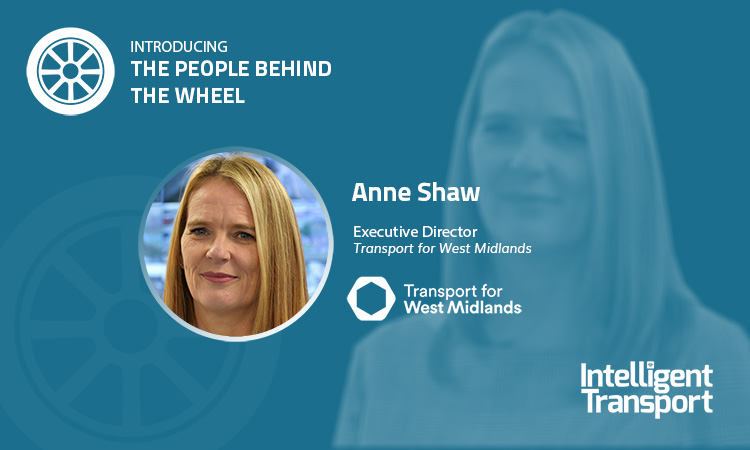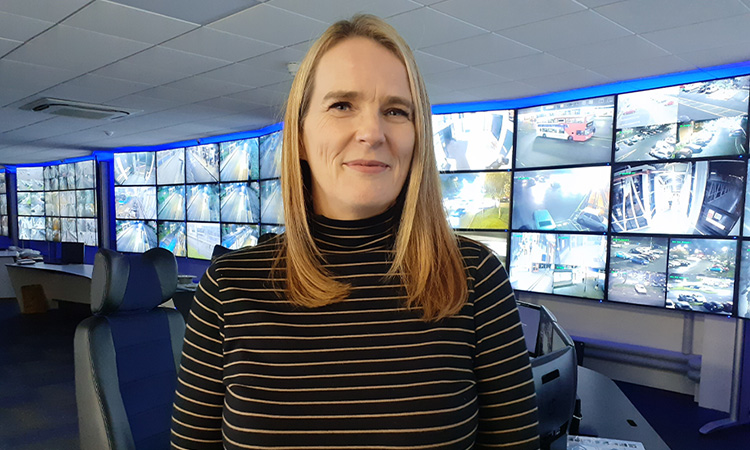The people behind the wheel: Anne Shaw’s story, Transport for West Midlands
- Like
- Digg
- Del
- Tumblr
- VKontakte
- Buffer
- Love This
- Odnoklassniki
- Meneame
- Blogger
- Amazon
- Yahoo Mail
- Gmail
- AOL
- Newsvine
- HackerNews
- Evernote
- MySpace
- Mail.ru
- Viadeo
- Line
- Comments
- Yummly
- SMS
- Viber
- Telegram
- Subscribe
- Skype
- Facebook Messenger
- Kakao
- LiveJournal
- Yammer
- Edgar
- Fintel
- Mix
- Instapaper
- Copy Link
Posted: 12 October 2023 | Anne Shaw - Transport for West Midlands | No comments yet
For the latest instalment of Intelligent Transport’s exclusive ‘The people behind the wheel’ series, Anne Shaw, Executive Director of Transport for the West Midlands, offers an in-depth exploration of her career to date, highlighting the significant challenges she has faced, as well as her visionary outlook for creating a sustainable, inclusive and technologically advanced future within the realm of the transportation industry.


Can you tell us about your role at Transport for the West Midlands?
I am the Executive Director and am also responsible for the transport function of the West Midlands Combined Authority (WMCA), where I am part of the executive team delivering against our strategic objectives around the economy, environment and social outcomes for the region.
We cover policy and strategy; innovation in new technologies and future transport services; delivery of a £2 billion transport infrastructure programme; the development of a pipeline of further projects; as well as the operational planning and delivery of services on public transport. We work closely with transport operators and local authorities, pooling data and intelligence to better manage our transport network on a day-to-day basis.
What inspired you to seek a career in the transport industry?
I was inspired through my upbringing to work in a public servant role and make a difference to people’s lives… I really fell into transport by accident – but I found my calling”
My background is in environmental science, but I was inspired through my upbringing to work in a public servant role and make a difference to people’s lives. This stems from where I grew up and my parents’ guidance, as public servants – they were police officers. I really fell into transport by accident – but I found my calling. I started my career as a drainage technician, but due to changes in the organisation, I undertook highway and traffic engineering qualifications and found that I had quite a technical brain – this led me, over the years, to a number of different roles in the transport sector, until I ended up leading the transport function at Birmingham City Council, before moving to the West Midlands Combined Authority.
I joined WMCA as Director of Network Resilience, focusing on establishing a function for the key route network in close collaboration with local transport authorities and operators to keep the West Midlands moving. Currently, I serve as the Executive Director of TfWM, where I’m passionate about the diverse aspects of transportation and our mission to positively impact the people and businesses of the West Midlands, enhancing their access to education, work, training and leisure opportunities for a thriving community.
Have you experienced any challenges in your role and, if yes, how have you overcome them?
There have been many challenges over the years, but some highlights would be kickstarting a process to introduce a clean air zone following a government mandate which had no political or public support to start with. Rather than see it as a problem for motorists, we framed it around the public health messaging. At the same time, we worked on the barriers and hardship for motorists and measures that we could take to ease the transition.
Then there was, of course, the COVID-19 pandemic and the challenge of keeping key workers moving, working with operators and then, once restrictions were lifted, re-building passenger confidence and supporting operators with funding challenges. We have, with our partners, been able to re-build services and, in the case of our tram network, brought the service back to pre-COVID-19 levels.
Has a career in transport changed your perception of the industry as a whole?
Transport offers a wide range of roles… This diversity is what I love about the industry; aside from connecting people and serving customers”
Yes – when I first started, I was the only women in the room, and I really fell into transport by accident, but I found my calling. Transport offers a wide range of roles, spanning from civil engineering to project management, finance and operations. This diversity is what I love about the industry; aside from connecting people and serving customers, there are numerous specialisations and career growth opportunities. However, there’s still much work to be done in changing perceptions and fostering a more diverse workforce.
I am pleased to say, however, that it’s now my experience that I am no longer the only woman, I have some great company. I see it as my obligation now to help grow that diverse workforce which reflects the communities that we serve. Therefore, I’ve introduced a Skills Academy to address training gaps through apprenticeships, graduate placements and a variety of roles. We’re making strides towards a more diverse organisation, a journey that benefits the organisation as a whole.


Credit: Transport for West Midlands
What would be the top three highlights of your career in the industry to date?
Firstly, leading the 2022 Commonwealth Games transport planning and operations through to delivery. This was a labour of love from start to finish”
Firstly, leading the 2022 Commonwealth Games transport planning and operations through to delivery. This was a labour of love from start to finish, from developing transport elements of the bid and then working closely with partners to ensure a secure transportation plan. Despite challenges in planning and execution, the excitement in the region and the recognition our team had received made it all worthwhile.
I’m also proud of delivering the Regional Transport Coordination Centre, a pioneering multi-agency, multimodal facility that unites the transport community for managing disruptions and generating valuable data. To bring this vision to life, I broke it down into manageable components and challenged my team, who excelled. We’ve become a model for others and are now not only aiding strategic operational planning, but also developing a detailed evidence-driven foundation for business case work and investment justifications.
Finally, leading the TfWM team in the largest urban area outside of London is a huge career highlight. The diversity of what we do, the difference that we make to people’s journeys and the people in the organisation make it a joy every day.
Where do you see yourself in five years’ time?
I have never really had a very regimented career plan, so this is a tough question. I still see myself working in transport and for TfWM, I want to continue our transformation journey to increase our capability in delivery and operations while improving the customer experience.
What key pieces of advice would you give to someone who is interested in a career in transport?
Transport offers a varied and interesting career – it is very diverse, whether you are working in operations, transport planning, project management, finance, new innovations, data and analysis. It is something that we all use, so being responsible for making that difference to how people travel and planning a more sustainable future for us all, is extremely rewarding.
In the future, what do you hope to see become more commonplace in the transport industry workforce?
We are all grappling with how technology and artificial intelligence (AI) will become commonplace in a lot of our roles as we strive to achieve our goal of a cleaner, greener and more inclusive transport system that serves everyone. This means giving people choices about when and how they travel conveniently and sustainably. To achieve this, ongoing innovation in both services and technologies will be essential.
In an ideal world, what do you hope the future of public transport will look like?
Transportation should cater to everyone, whether it’s a planned journey or a personal one”
Clean, green, hassle-free and affordable, offering a range of choices. This ensures that we have inclusive communities and breaks down current barriers that some communities face in terms of travel and accessing opportunities. Transportation should cater to everyone, whether it’s a planned journey or a personal one, enabling access to education, work and social options.


Related topics
Passenger Experience, Public Transport, Staff & Skills Development, The People Behind the Wheel Series, Workforce Inclusivity, Workplace
Related modes
Bus & Coach, Metro, Tram
Related cities
Birmingham
Related countries
United Kingdom
Related organisations
Birmingham City Council, Transport for West Midlands (TfWM), West Midlands Combined Authority (WMCA)
Related people
Anne Shaw








